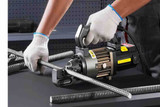Maryland's Ultimate Comparison of Corded vs. Cordless Power Tools
In Maryland's diverse construction and manufacturing landscape, the choice between corded and cordless power tools can significantly impact productivity, efficiency, and overall project success. This comprehensive guide will explore the pros and cons of both options, helping Maryland professionals make informed decisions for their specific needs.
1. Power and Performance
Corded Tools:
- Consistent power output
- Higher torque for demanding tasks
- No battery life limitations
Cordless Tools:
- Improving battery technology narrows performance gap
- Variable power output as battery drains
- Limited runtime, but easily swappable batteries
Maryland Perspective:
In Maryland's varying job sites, from urban Baltimore to rural Western Maryland, power consistency can be crucial. Corded tools excel in situations requiring prolonged, high-power usage, such as concrete work or heavy-duty sawing. However, cordless tools are increasingly capable of handling tough jobs, especially with the advent of brushless motors and high-capacity batteries.
2. Portability and Convenience
Corded Tools:
- Limited by cord length and power outlet availability
- No need to carry or change batteries
- Generally lighter without battery weight
Cordless Tools:
- Unrestricted movement
- Ideal for remote or elevated work areas
- Additional weight from batteries
Maryland Perspective:
Maryland's diverse work environments, from crowded urban construction sites to sprawling rural projects, often benefit from the flexibility of cordless tools. However, for workshop settings or large-scale industrial applications where mobility is less critical, corded tools remain a practical choice.
3. Cost Considerations
Corded Tools:
- Generally lower initial cost
- No ongoing battery replacement expenses
- Potentially longer lifespan
Cordless Tools:
- Higher upfront investment
- Recurring costs for battery replacements
- Potential savings on extension cords and generators
Maryland Perspective:
With Maryland's strong economy and diverse industry needs, cost-effectiveness is crucial. While cordless tools often have a higher initial cost, their versatility can lead to long-term savings, especially for businesses frequently working in areas without readily available power sources.
4. Durability and Maintenance
Corded Tools:
- Fewer components to fail
- No battery degradation over time
- Potential cord damage and wear
Cordless Tools:
- Battery life diminishes over time
- More complex internal components
- Less vulnerable to power surges
Maryland Perspective:
Maryland's varying climate, from humid summers to cold winters, can affect tool durability. Cordless tools may require more careful storage and maintenance of batteries, while corded tools need attention to cord condition, especially in outdoor or rugged environments.
5. Environmental Impact
Corded Tools:
- No battery disposal issues
- Energy-efficient operation
- Potential for longer lifespan
Cordless Tools:
- Battery recycling necessary
- Energy lost in charging process
- Improving battery technology for longer life
Maryland Perspective:
With Maryland's strong focus on environmental sustainability, the eco-friendliness of tools is an important consideration. While corded tools avoid battery disposal issues, advancements in battery recycling programs and the energy efficiency of cordless tools are narrowing the gap.
6. Specific Tool Comparisons
Drills
- Corded: Best for prolonged, high-torque applications
- Cordless: Excellent for most general construction and DIY tasks
Circular Saws
- Corded: Preferred for continuous cutting of thick materials
- Cordless: Great for quick cuts and finish work
Angle Grinders
- Corded: Ideal for heavy-duty metalwork and masonry
- Cordless: Suitable for light to medium-duty tasks and on-site work
Reciprocating Saws
- Corded: Best for demolition work and extended use
- Cordless: Excellent for plumbing and electrical work in tight spaces
Impact Drivers
- Corded: Rare, as cordless versions dominate this category
- Cordless: Preferred for their compact size and high torque
7. Industry-Specific Considerations in Maryland
Construction:
- Cordless tools shine in new construction, offering flexibility across large job sites
- Corded tools remain valuable for tasks requiring sustained power, like concrete work
Manufacturing:
- Corded tools often preferred for assembly lines and fixed workstations
- Cordless tools valuable for maintenance and adjustments on large equipment
Automotive:
- Cordless tools dominate for their maneuverability around vehicles
- Corded tools still used for heavy-duty tasks like tire changes or body work
Woodworking:
- A mix of woodworking corded and cordless tools, with corded preferred for stationary equipment
- Cordless tools gaining popularity for finish work and on-site installations
8. Future Trends
Advancing Battery Technology:
- Lithium-ion batteries continue to improve in capacity and lifespan
- New battery chemistries promise even better performance
Hybrid Tools:
- Tools that can operate both corded and cordless are emerging
- Offers flexibility for various job site conditions
Smart Tools:
- Integration of Bluetooth and IoT technology in cordless tools
- Enhanced tool tracking and performance monitoring
Comparison Table: Corded vs. Cordless Tools
| Factor | Corded Tools | Cordless Tools |
| Power Output | Consistent, High | Variable, Improving |
| Portability | Limited by Cord | Highly Portable |
| Initial Cost | Lower | Higher |
| Long-term Cost | Lower (No Batteries) | Higher (Battery Replacement) |
| Weight | Generally Lighter | Heavier with Battery |
| Runtime | Unlimited | Limited by Battery |
| Maintenance | Simpler | More Complex |
| Environmental Impact | No Battery Waste | Battery Recycling Required |
| Best For | Sustained, High-Power Tasks | Flexibility and Remote Work |
Related Articles:
- Power Tools vs Hand Tools: Which is Right for You?
- Why cordless power tools are taking over the market and how to choose the right ones for you
- The Evolution of Automotive Tools: From Hand Tools to High-Tech Gadgets
- Essential Power Tools for Mechanic Workshops: Power Up Your Workshop with These Essentials
- Modern Innovations in Workshop Tools: Explore the Latest in Tool Technology
Frequently asked question
1. Are cordless tools powerful enough for professional use in Maryland's construction industry?
Yes, modern cordless tools, especially those with brushless motors and high-capacity batteries, are now capable of handling most professional construction tasks in Maryland. However, for prolonged, high-power applications, corded tools may still be preferred.
2. How do Maryland's varying weather conditions affect the choice between corded and cordless tools?
Maryland's hot summers and cold winters can impact battery performance in cordless tools, potentially reducing runtime and lifespan. Corded tools are less affected by temperature but may pose safety risks in wet conditions. Proper tool storage and maintenance are crucial for both types.
3. For a small Maryland-based contractor, is it better to invest in corded or cordless tools?
For small contractors in Maryland, a mix of both is often ideal. Cordless tools offer flexibility for various job sites, while a few key corded tools can handle more demanding tasks. Consider the types of projects you typically handle and invest accordingly.
4. How do Maryland's electrical codes and job site regulations impact the use of corded vs. cordless tools?
Maryland follows the National Electrical Code (NEC), which has specific requirements for temporary power on construction sites. Cordless tools can simplify compliance by reducing the need for extensive temporary wiring, potentially lowering inspection and setup costs.
5. Are there any Maryland-specific incentives for using more energy-efficient power tools?
While there are no direct incentives for power tool efficiency, Maryland offers various energy efficiency programs for businesses. Using cordless tools, especially those with energy-efficient chargers, can contribute to overall energy savings and potentially qualify for broader efficiency incentives.
Conclusion:
The choice between corded and cordless power tools in Maryland depends on various factors including the specific industry, job site conditions, and individual project requirements. While cordless tools continue to gain popularity due to their flexibility and improving performance, corded tools still have their place in many applications. By carefully considering the pros and cons of each option, Maryland professionals can make informed decisions that optimize their efficiency, productivity, and bottom line.
Ready to upgrade your power tool arsenal? Visit Tend Industrial Supplies at tendsupplies.com for a wide selection of both corded and cordless power tools from top brands. Our knowledgeable staff can help you choose the perfect tools for your specific needs in Maryland's diverse work environments. Don't let outdated tools hold you back – power up your productivity with the right equipment today!









